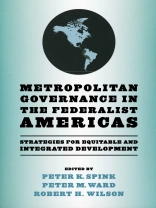Despite rapid metropolitanization throughout the Americas and widespread interest in “megacities, ” few studies have examined the new governance structures needed to address issues of citizen representation and participation and the public service challenges of population expansion and increasing urban inequalities. To fill that void, Peter K. Spink, Peter M. Ward, Robert H. Wilson, and the other contributors to this volume provide original research and analysis of the principal metropolitan areas in six federalist countries of the Americas—Argentina, Brazil, Canada, Mexico, the United States, and Venezuela. They find that a common feature of metropolitan expansion is the lack of a unified governmental structure. Using a comparative research framework, they examine the forms, functions, legitimacy, and performance of emerging governmental structures.
Their cross-national study shows that existing institutional structures and political systems impede collaboration among governments in metropolitan areas. Given both the relatively few successful models at the local level and the disinterest on the part of federal governments, regional governments—states and provinces—seem to provide the most pragmatic bases for constructing metropolitan governments that are capable of efficiently delivering services. Because there is no direct path to achieve such new structures, the authors urge reform at the state and local levels to address the need to work out the politics and management structures that will function best within their own politics.
Yazar hakkında
Robert H. Wilson is Mike Hogg Professor of Urban Policy and associate dean and professor at the Lyndon B. Johnson School of Public Affairs at the University of Texas at Austin.












